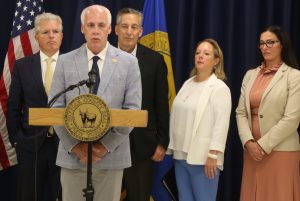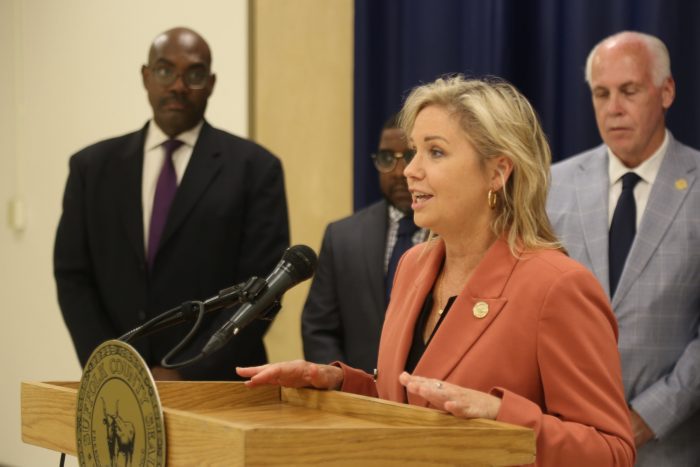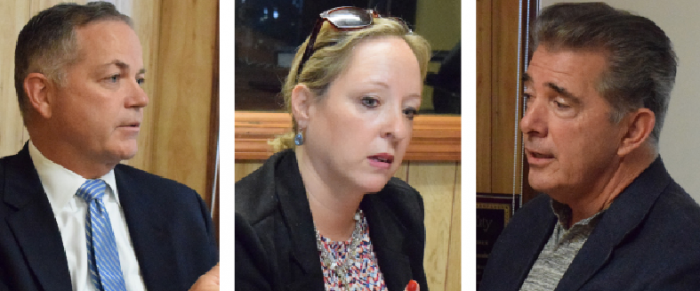Suffolk County has taken another step forward in appropriating roughly $200 million in opioid settlement funds.
County officials gathered at the H. Lee Dennison Building in Hauppauge on Friday, Aug. 25, announcing the opening of a second application portal for $20 million in additional funds. The first round of $25 million in settlement payments had concluded earlier this year. [See story, “County picks groups to receive $25M for first round in opioid settlement,” Jan. 20, 2023, TBR News Media website.]
Suffolk County Executive Steve Bellone (D) referred to this new round of funding as a “significant milestone in our battle and our fight against the opioid epidemic,” coming from a projected $200 million settlement between Suffolk County and various opioid manufacturers, distributors, retailers and other entities that contributed to the scourge of addiction throughout the county.
Bellone affirmed the county’s “unwavering commitment to address the opioid crisis head-on as well as to provide vital support to combat addiction.”
The county executive added, “All of us working on this issue understand that it is critical that we spend these dollars as effectively and efficiently as possible, that we are stewards of these dollars.”

Kevin McCaffrey (R-Lindenhurst), presiding officer of the county Legislature, reinforced this messaging, noting how the funds received through the settlement are significant in their purpose.
“This money didn’t come at a small cost,” he said. “This is not our money. This belongs to the victims and the families that were affected by this opioid crisis,” adding, “We need to make sure when we make these decisions that we keep in mind that all this money that we are distributing … is used judiciously because it did come at a very high price.”
Minority Leader Jason Richberg (D-West Babylon) encouraged all interested, qualifying organizations to apply for these funds.
“The monies that we’re talking about here will change the lives of families and help put people in the right direction,” he contended. “To any of those organizations that are listening to this conversation — please, please apply.”
County Legislator Sarah Anker (D-Mount Sinai), chair of the county’s Addiction Advisory Council, outlined the various causes to which these funds will soon be directed, from drug prevention to education services to rehabilitation, among other resource providers.
“All those entities — that are really under the county’s purview — are ready and willing to do more,” she said. “The main word here is ‘resources,’ and that’s pretty much what our panel focuses on — resources that our residents need to fight and combat the epidemic.”
Rebecca Sanin, president and CEO of the Health and Welfare Council of Long Island, emphasized the conditions and trends currently happening on the ground throughout the area. She highlighted the collateral damage opioids produce for communities and societies.
“Those losses that addiction accumulates emotionally bankrupts and destroys individual lives, destroys families, destroys communities and leaves vacant unmet potential in a society that is nostalgic and hungry for progress,” Sanin said. “This announcement will mean that lives are saved. It will mean that hope is levied.”
Sharon Richmond, whose son Vincent died from an overdose at 25, described her son as sensitive, funny and intelligent — an aspiring lawyer who sought to stand up for those who couldn’t defend themselves.
“However, once oxycodone became his drug of choice, his dreams and hopes were shattered along with ours,” she said. “No family should ever have to face the tragedy mine had to endure.”
She continued, “No amount of money can ever bring back my son Vincent or the 107,000 human lives lost just last year. However, with these opioid settlement funds, I see hope, and I see life for so many thousands of loved ones.”
The application portal for the $20 million is currently live. It will remain open until close of business on Friday, Sept. 29.
To apply, please click the following link: www.suffolkcountyny.gov and search under “Opioid Grant Application.”













